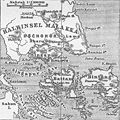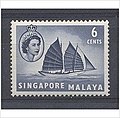Portal:Singapore
 Map of Singapore Singapore, officially the Republic of Singapore, is an island country and city-state in maritime Southeast Asia. It is about one degree of latitude (137 kilometres or 85 miles) north of the equator, off the southern tip of the Malay Peninsula, bordering the Strait of Malacca to the west, the Singapore Strait to the south along with the Riau Islands in Indonesia, the South China Sea to the east, and the Straits of Johor along with the State of Johor in Malaysia to the north.
The country's territory comprises one main island, 63 satellite islands and islets, and one outlying islet; the combined area of these has increased by approximately 25% since the country's independence as a result of extensive land reclamation projects. It has the third highest population density of any country in the world, although there are numerous green and recreational spaces as a result of urban planning. With a multicultural population and in recognition of the cultural identities of the major ethnic groups within the nation, Singapore has four official languages: English, Malay, Mandarin, and Tamil. English is the common language, with exclusive use in numerous public services. Multi-racialism is enshrined in the constitution and continues to shape national policies in education, housing, and politics. Singapore's history dates back at least eight hundred years, having been a maritime emporium known as Temasek and subsequently a major constituent part of several successive thalassocratic empires. Its contemporary era began in 1819, when Stamford Raffles established Singapore as an entrepôt trading post of the British Empire. In 1867, Singapore came under the direct control of Britain as part of the Straits Settlements. During World War II, Singapore was occupied by Japan in 1942 and returned to British control as a separate Crown colony following Japan's surrender in 1945. Singapore gained self-governance in 1959 and, in 1963, became part of the new federation of Malaysia, alongside Malaya, North Borneo, and Sarawak. Ideological differences led to Singapore's expulsion from the federation two years later; Singapore became an independent sovereign country in 1965. After early years of turbulence and despite lacking natural resources and a hinterland, the nation rapidly developed to become one of the Four Asian Tigers. With its growth based on international trade and economic globalisation, it integrated itself with the world economy through free trade with minimal trade barriers and tariffs, export-oriented industrialisation, and the large accumulation of received foreign direct investments, foreign exchange reserves, and assets held by sovereign wealth funds. As a highly developed country, it has one of the highest GDP per capita (PPP) in the world. It is also identified as a tax haven. Singapore is the only country in Asia with a AAA sovereign credit rating from all major rating agencies. It is a major aviation, financial, and maritime shipping hub and has consistently been ranked as one of the most expensive cities to live in for expatriates and foreign workers. Singapore ranks highly in key social indicators: education, healthcare, quality of life, personal safety, infrastructure, and housing, with a home-ownership rate of 88 percent. Singaporeans enjoy one of the longest life expectancies, fastest Internet connection speeds, lowest infant mortality rates, and lowest levels of corruption in the world. Singapore is a parliamentary republic in the Westminster tradition of unicameral parliamentary government, and its legal system is based on common law. While the country is de jure a multi-party democracy with free elections, the government under the People's Action Party (PAP) wields widespread control and political dominance. The PAP has governed the country continuously since full internal self-government was achieved in 1959, and holds a supermajority in Parliament. One of the five founding members of ASEAN, Singapore is also the headquarters of the Asia-Pacific Economic Cooperation Secretariat, the Pacific Economic Cooperation Council Secretariat, and is the host city of many international conferences and events. Singapore is also a member of the United Nations, the World Trade Organization, the East Asia Summit, the Non-Aligned Movement, and the Commonwealth of Nations. (Full article...)Selected article -Tropical Storm Vamei (also known as Typhoon Vamei) was a Pacific tropical cyclone that formed at about 85 nautical miles (100 mi; 160 km) from the equator—closer than any other tropical cyclone on record. The last storm of the 2001 Pacific typhoon season, Vamei developed on 26 December at 1.4° N in the South China Sea. It strengthened quickly and made landfall along extreme southeastern Peninsular Malaysia. Vamei rapidly weakened into a remnant low over Sumatra on 28 December, and the remnants eventually re-organized in the North Indian Ocean. Afterward, the storm encountered strong wind shear once again, and dissipated on 1 January 2002. Though Vamei was officially designated as a tropical storm, its intensity is disputed; some agencies classify it as a typhoon, based on sustained winds of 120 km/h (75 mph) and the appearance of an eye. The storm brought flooding and landslides to eastern Peninsular Malaysia, causing $3.58 million in damage (2001 USD, $6.16 million 2024 USD) and five deaths. (Full article...)Selected picture Little India is an ethnic neighbourhood found in Singapore that has Indian cultural elements. Little India lies to east of the Singapore River—across from Chinatown, located west of the river—and north of Kampong Glam. Both areas are part of the urban planning area of Rochor. Read more... General imagesThe following are images from various Singapore-related articles on Wikipedia.
Selected biography -Reginald Hugh Hickling, CMG, QC (2 August 1920 – 11 February 2007), known as Hugh Hickling, was a British lawyer, civil servant, law academic, and author, and author of the controversial Internal Security Act of colonial Malaysia. Born in Derby, England, Hickling served from 1941 until 1946 in the British Royal Navy during World War II, and then joined the Colonial Legal Service. In 1955, Hickling was posted to Malaya (now Malaysia), where he gained prominence as a lawmaker. He drafted the Constitution of Malaysia, and as Commissioner of Law Revision wrote the Internal Security Act (ISA) of 1960, which provided for the detention of persons without trial. The ISA was later used to suppress political opponents or those dedicated to non-violent activities, which Hickling later said was not his intention. (Full article...)Did you know (auto-generated)
In this month
More did you know -
Selected panoramaThe skyline of Singapore's Central Business District in daytime. Notable landmarks in the picture includes the new and old Supreme Court of Singapore and the skyscrapers in the Marina Bay area. Singapore topicsRelated portalsSoutheast Asia Other Countries Tasks
CategoriesWikiprojectsAssociated WikimediaThe following Wikimedia Foundation sister projects provide more on this subject:
Discover Wikipedia using portals |































































